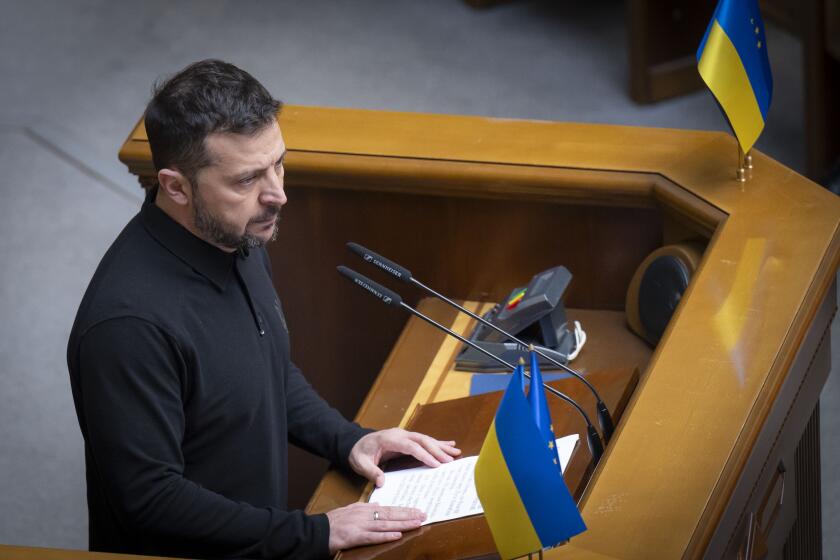A small town in Italy was losing population. Now Syrian refugees are key to its survival
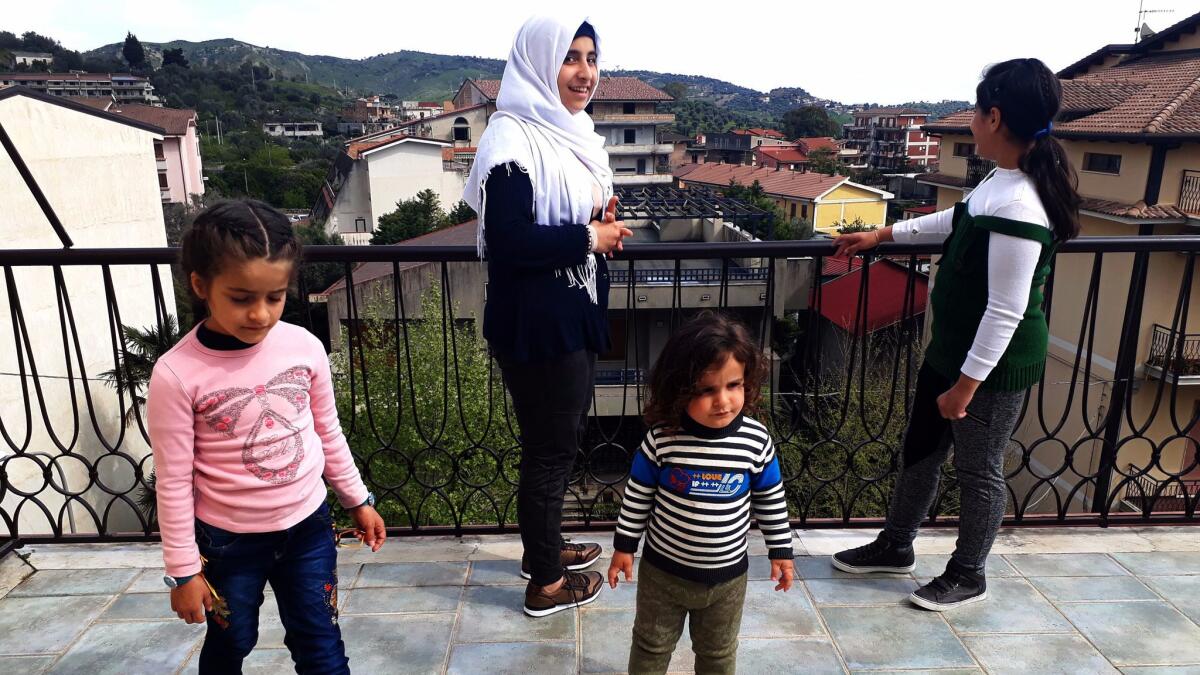
Reporting from RIACE, Italy â From the kitchen of their new apartment, Mohammed Ali and Kinda Nonoo watched their children run across a rooftop terrace with a view of the rolling green hills of southern Italy. They could see a shining sliver of the Mediterranean Sea, four miles away.
The tranquility of the scene was a marked change from war-torn Aleppo, Syria, which Ali and his family had fled nearly five years ago, and the chaotic situation they had found in Lebanon afterward.
And unlike in Lebanon, where the estimated 1.5 million Syrian refugees were seen as pulling jobs away from the local population, leaders in this Italian community were pinning their hopes on the refugees helping to rebuild its economy.
The family from Aleppo had landed in the southern province of Reggio Calabria, an area that young Italians have largely abandoned in search of better economic opportunities in the north and abroad, leaving behind shuttered schools and fallow fields. In the four-story building the Syrian family now occupied, the two floors below were empty.
Over the last decade, a flood of migrants and refugees have begun to replace the Italians who left. From 2008 to 2013, the percentage of foreign migrant workers in the Italian farm industry nearly doubled to 37% from 19%, according to the National Institute of Agricultural Economics.
The town of Riace, where Ali and his family settled when they first arrived in Italy, has garnered international attention in recent years for making a deliberate effort to attract migrants from around the world. Immigrants from more than 20 countries now make up one-third of the townâs population of 1,500, said Mayor Domenico Lucano.
A safer journey
The transition, for some, has not been easy.
The Syrian couple and their five children arrived in Italy in late February via the âhumanitarian corridorsâ program launched a year ago by a pair of nongovernmental organizations affiliated with the Catholic Church and a coalition of Protestant churches.
The project, funded by the money Italian citizens divert from their taxes to the churches, has brought about 800 Syrian refugees from Lebanon to communities throughout Italy since February 2016. It will bring 200 more refugees from Lebanon and possibly Morocco, along with about 500 Africans now living in Ethiopia.
Many new arrivals cross the Mediterranean on smuggler boats â and many more donât make it. Last year, more than 5,000 people died in the Mediterranean, according to the United Nations refugee agency. The main aim of the new humanitarian corridors project was to prevent refugees from attempting the dangerous sea crossing, said Paolo Naso of the Federation of Protestant Churches in Italy, one of the architects of the program.
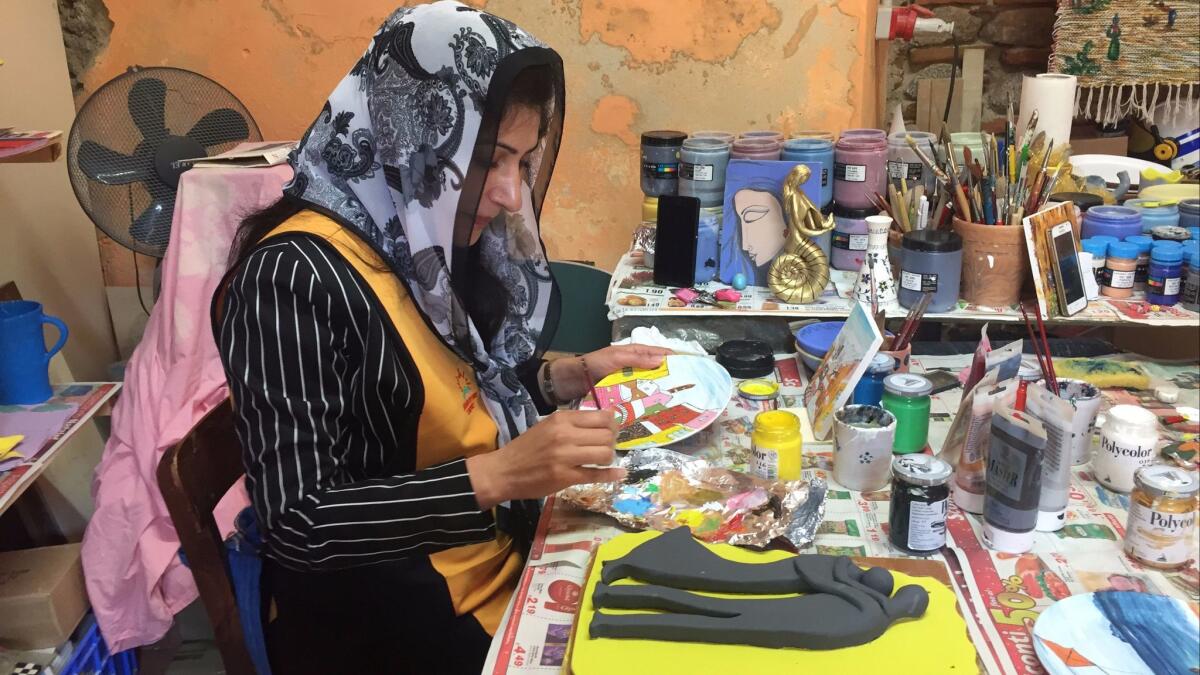
Under the new initiative, the church organizations fly the refugees to Rome and take them to their new homes in communities around the country.
Naso and others hope, in part, that a new generation of workers from abroad could help replace the nationâs shrinking workforce if they can be integrated into Italian society. âOur population is aging and declining and the decay is very severe, especially in the rural areas,â he said.
Italy has taken in fewer than 1,000 refugees through the official U.N. resettlement program since 2015, but has seen much larger numbers arriving in smuggler boats.
The arrivals have been met with some surges of anti-immigrant sentiment. Last year, residents of the central town of Gorino put up barricades to block the arrival of a small group of refugee women. But migrants and refugees have also had an influential defender in Pope Francis, who has brought a few Syrian refugees to the Vatican and urged Catholic parishes to take in more.
In Riace, the migrants come from sub-Saharan Africa, Pakistan, Afghanistan, Bangladesh and, now, Syria. Immigrants herd sheep in the rolling hills surrounding the town, drive tractors on the winding road leading up to it, sweep the streets in the town square and work alongside Italian residents in the handful of artisan shops in the townâs center.
A âhumane alternativeâ
The push to welcome migrants earned Lucano, the mayor, a spot on Fortune magazineâs list of the worldâs 50 greatest leaders last year.
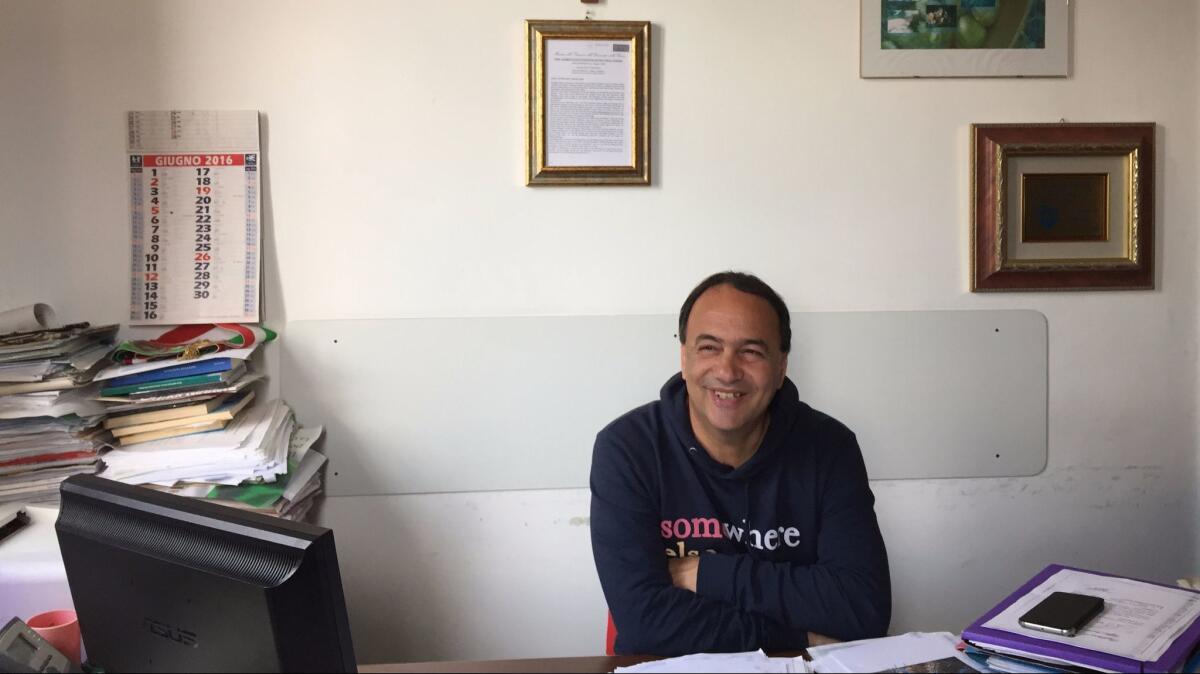
âWe are basically proposing a humane alternative,â the mayor said in an interview at Riaceâs City Hall. âThis is the message we are sending to this world where closures and barriers are prevailing.â
On a recent afternoon, Gabriel Effah, a Ghanaian who came in a smugglerâs boat from Libya eight months ago, sat on a bench outside the townâs park chatting with a friend as a gaggle of newly arrived African teenagers passed by on the road leading into the townâs center.
âBambinos,â Effah said, using his new Italian. âEvery day people come.â
Stella Awini, 30, also from Ghana, left her young son with relatives and made the sea journey three years ago. After the boat landed on the island of Lampedusa, police brought her to Riace. When she first arrived, she swept the streets, then helped supervise children in the local school until it closed because of a lack of enrollment. Now she cooks for unaccompanied minors living in a group home.
âThe life in Riace is very good for me,â she said. âThey take immigrants as their own, as Italian people.â
About 100 of the migrants in Riace have settled as long-term residents, Lucano said. Others, like the newly arrived Syrian families, find the situation less welcoming and move on.
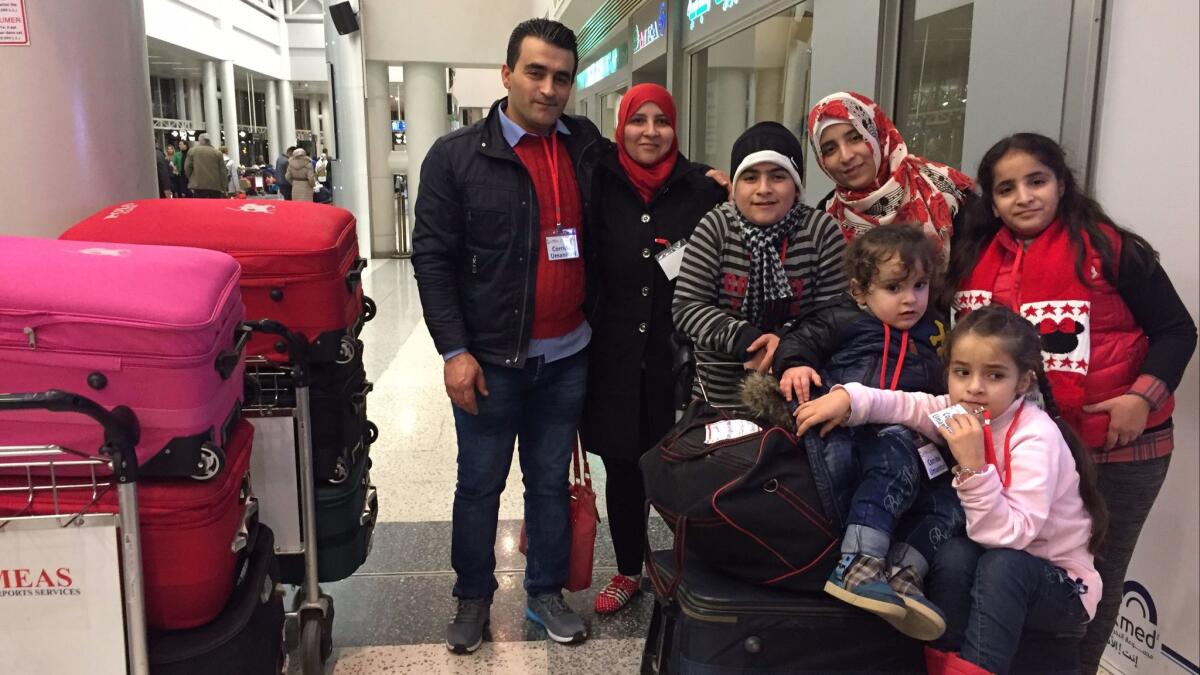
Tears of happiness
When Ali and Nonoo unloaded their luggage at the airport in Beirut in preparation for their flight to Italy, their 15-year-old daughter, Mais, broke down in tears of happiness and relief.
In Aleppo, Mais had watched her aunt â Aliâs sister â and five cousins die in an airstrike below the familyâs apartment.
Ali and his family fled to Lebanon, where they escaped the bombs, but not all violence. Maisâ brother Ali, a plump and cheerful 14-year-old, bears a scar below one knee from a knife attack by a group of older boys. The young men were affiliated with Hezbollah, the Shiite Muslim political party and militia that supports Syrian President Bashar Assad and sees the refugees as enemies, Nonoo said.
âThere was no security there, never, never,â she said. âEven if we wanted to go out to see the doctor, we tried to make sure no one would see us. Here, the first thing that has improved is that there is security.â
But in other ways, the transition has been difficult. In Riace, few of the other immigrants spoke Arabic, and the family didnât get along with the two Ethiopians who served as interpreters and go-betweens with the local authorities.
After a month in Riace, Ali and his family asked to be relocated to a nearby town, Gioiosa Ionica, where they joined another Syrian family.
Gioiosa Ionica has a smaller immigrant population â about 100 among 7,000 inhabitants â but some local leaders are hoping to attract more.
Maurizio Zavaglia, president of the town council, hopes the Syrian families and other migrants will help revive the local farming industry and bring in tourists looking for a quiet retreat amid vineyards and olive groves.
âBefore, the people who came here stayed for just a little time because after a while they saw the condition of this area, that we are not very rich, there is a high rate of unemployment,â he said. âAfter a while they went, some to Germany, Switzerland, all over. The challenge with these families is to give them a sense of stability and a longer permanency.â
âMy head is hurtingâ
In Gioiosa Ionica, Ali and Nonoo said, the people were kind, but the family still felt isolated, and the language barrier became an additional problem as Mais was suffering from a perplexing medical issue. In Riace, she had begun to complain of persistent severe headaches and dizziness. Eventually, the family was able to get her to a hospital, where a doctor gave her medication. It didnât help.
A week after the move to Gioiosa Ionica, Mais collapsed in the hallway one afternoon, screaming, âMy head is hurting me!â Zavaglia and an Italian friend happened to be present. The Italians called paramedics, who took the girl to a hospital in another town.
The family came home several hours later with a referral to another hospital and no answer to what was causing the problem.
The next day, with the children playing on the terrace after dinner, Ali and Nonoo talked anxiously about the difficulty of accessing medical care in the remote area and in another language, and about the prospects of finding work that would sustain them once they stop receiving the small amount of aid they were getting via the program.
In Syria, Ali had run a restaurant and bakery. He hoped to do the same in Italy, but without enough money or a grasp of Italian, the prospect seemed far-fetched.
âWe can work, but without the language itâs difficult,â Nonoo said. âWe love Italy and the Italian people and the language, but if they give us low wages, I donât know.â
Could they go to Canada instead? Ali asked. Or Germany?
But the children were happy with their new home. In Lebanon, they hadnât gone to school for most of the last five years. Now after a few weeks of Italian lessons, they had learned to rattle off numbers, months, names of fruits and vegetables and were excited to start attending the local public school.
âItâs much better here,â said Ali, the coupleâs son. âHere, there is hope.â
A Moroccan man passing by as the boy and one of his younger sisters stood outside a neighborâs house one afternoon stopped and asked in Arabic, âAre you Arab?â
Yes, Ali told him, from Syria.
âThank God for your safety,â the man said, and smiled as he continued down the otherwise empty street.
Sewell is a special correspondent.
ALSO
Hereâs one way of fighting terrorism that the U.S. may be rethinking under Trump
These Syrians were finally being evacuated to safety. Thatâs when the bomb went off
Italy offers a glimpse of the international concern over violent extremism in prisons
More to Read
Sign up for Essential California
The most important California stories and recommendations in your inbox every morning.
You may occasionally receive promotional content from the Los Angeles Times.











